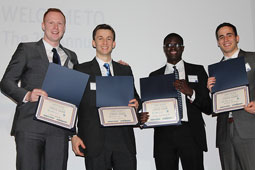Brandeis team prevails in second annual economic crisis game

The 2014 Crisis Game winning team (from left) Alex Schmidt, Toma Cubrilo, Rosby Kome-Mensah II, and Mitchell Schwartz
Brandesia is a nation plagued by corruption, human rights violations and dependence on oil exports, not to mention a brain drain. Fortunately, a full-blown economic crisis in this fictional Middle East country was solved in fewer than four hours by a handful of Brandeis undergraduates.
Last Friday’s second annual intercollegiate Crisis Game, hosted by the Brandeis chapter of the National Association for Business Economics (NABE) and the Brandeis International Business School (IBS), ended with the youngest and tallest team of Brandeis IBS students devising the most viable economic strategy to address the woes of the bedeviled Brandeisia.
Team 1 — or, as they called themselves, “Team Nearly 7 Feet Tall” — beat out another Brandeis IBS team as well as a team from Bentley University and one from Fordham University. The winners, Mitchell Schwartz ’14, MA’15; Rosby Kome-Mensah II ’14, MA’15; Toma Cubrilo ’14, MA’15; and Alex Schmidt ’14, MA’15, shared a $250 cash prize.
The panel of judges consisted of Jeffrey C. Fuhrer of the Federal Reserve Bank of Boston; Sara Johnson of IHS Economics; David Katsnelson, MBA’09, of RISI; Stuart P.M. Mackintosh of Group of Thirty; and Olaf Unteroberdoerster, PhD’98, of the International Monetary Fund.
“The game is very realistic — the decisions are not made purely on data but on the cultural, military and political context,” said Mackintosh.
“The first NABE Crisis Game last year was a fun way for students to engage with simulations of crises such as those that we deal with at the Fed,” added Fuhrer. “It is excellent that this turned into an academic challenge.”
Anna Gramer, MA’14, and Alok Mistry, MA’14, co-presidents of NABE, focused on expanding the game this year. This included awarding a cash prize and organizing a post-competition career fair with representatives from McKinsey & Company, IHS Economics, RISI and the Boston NABE Chapter. The winners also won the chance to interview for an internship this summer with one of the judges’ employers.
“I think the most successful thing was having the different participants tell me how much they enjoyed the game,” said Gramer. “They were so happy just to have competed at all.”
More details about this year's competition are available on the Brandeis IBS website.
Categories: Business, Student Life





